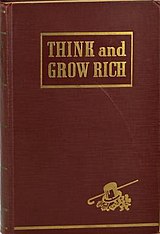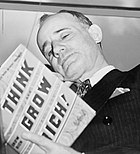Think and Grow Rich: Difference between revisions
→Notes: Think and grow rich has benefits and criticism. Tag: Reverted |
|||
| Line 42: | Line 42: | ||
==Notes== |
==Notes== |
||
{{Reflist|2}}{{Wikisource|Think and Grow Rich|Think & Grow Rich}}{{Wikiquote|Napoleon Hill}} |
{{Reflist|2}}{{Wikisource|Think and Grow Rich|Think & Grow Rich}}{{Wikiquote|Napoleon Hill}} |
||
Think and grow rich benefits and criticism [[https://habbitts.com/is-think-and-grow-rich-worth-reading/ Is think and grow rich worth reading?]]: |
|||
==Further reading== |
==Further reading== |
||
Revision as of 13:50, 20 March 2022
 Original Hardcover | |
| Author | Napoleon Hill |
|---|---|
| Original title | Think and Grow Rich |
| Language | English |
| Subject | Personal-success Self-help |
| Genre | Non-fiction |
| Publisher | The Ralston Society |
Publication date | 1937 |
| Publication place | United States |
| Media type | Print (Hardcover, Paperback, E-Book) |
| Pages | 238 pages |
| ISBN | 978-1-78844-102-5 |
| OCLC | 156886959 |
Think and Grow Rich is a book written by Napoleon Hill in 1937 and promoted as a personal development and self-improvement book. He claimed to be inspired by a suggestion from business magnate and later-philanthropist Andrew Carnegie.[1]
First published during the Great Depression,[2] the book has sold more than 15 million copies[3]
It remains the biggest seller of Napoleon Hill's books. BusinessWeek magazine's Best-Seller List ranked it the sixth best-selling paperback business book 70 years after it was published.[4] Think and Grow Rich is listed in John C. Maxwell's A Lifetime "Must Read" Books List.[5]
While the book's title and much of the writing concerns increasing income, the author proclaims that his philosophy can help people succeed in any line of work, to do and be anything they can imagine.[6]
Think and Grow Rich is based on Hill's earlier work The Law of Success, and is the result of more than twenty years of study of many individuals who had amassed personal fortunes.[2]
Hill studied their habits and drew some 16 "laws" to be applied to achieve success. Think and Grow Rich condenses them, providing the reader with 14 principles in the form of a "Philosophy of Achievement".[2]

Notes
- ^ Briley, Richard Gaylord, 1995, The Seven Spiritual Secrets Of Success, Thomas Nelson Publishers, ISBN 0-7852-8083-9, p. 151.
- ^ a b c Michael J. Ritt and Kirk Landers, A Lifetime of Riches: The Biography of Napoleon Hill. Revised edition 1995, ISBN 0-525-94146-0.
- ^ Penguin, https://www.penguin.com.au/books/think-and-grow-rich-9780091900212 [better source needed]
- ^ The BusinessWeek Best-Seller List, in: BusinessWeek magazine, January 15, 2007.
- ^ Maxwell, John, A Lifetime "Must Read" Books List, March 2008.
- ^ Hill, Napoleon, 1960, Think and Grow Rich. [Revised Edition, p. 19], Fawcett Books, New York, ISBN 0-449-21492-3.
Think and grow rich benefits and criticism [Is think and grow rich worth reading?]:
Further reading
- Hill, Napoleon (1937). Think And Grow Rich. The Ralston Society. ISBN 978-1-78844-102-5. Retrieved January 2, 2019.
- Success Through A Positive Mental Attitude, by Napoleon Hill and W. Clement Stone. ISBN 1-4165-4159-4.
- Earl Nightingale Reads Think and Grow Rich [The essence of Napoleon Hill's Think and Grow Rich], by Earl Nightingale. ISBN 1-4558-1011-8.
- The Biblical Companion Guide to Think & Grow Rich, by Joshua J. Finley. ISBN 9798603771335
